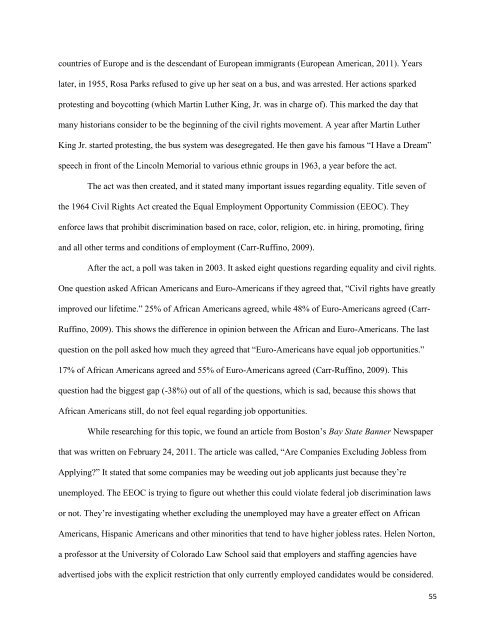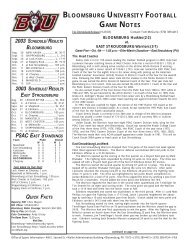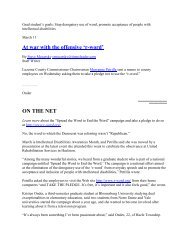Human Rights at Home and Abroad: Past, Present, and Future
Human Rights at Home and Abroad: Past, Present, and Future
Human Rights at Home and Abroad: Past, Present, and Future
You also want an ePaper? Increase the reach of your titles
YUMPU automatically turns print PDFs into web optimized ePapers that Google loves.
countries of Europe <strong>and</strong> is the descendant of European immigrants (European American, 2011). Years<br />
l<strong>at</strong>er, in 1955, Rosa Parks refused to give up her se<strong>at</strong> on a bus, <strong>and</strong> was arrested. Her actions sparked<br />
protesting <strong>and</strong> boycotting (which Martin Luther King, Jr. was in charge of). This marked the day th<strong>at</strong><br />
many historians consider to be the beginning of the civil rights movement. A year after Martin Luther<br />
King Jr. started protesting, the bus system was desegreg<strong>at</strong>ed. He then gave his famous ―I Have a Dream‖<br />
speech in front of the Lincoln Memorial to various ethnic groups in 1963, a year before the act.<br />
The act was then cre<strong>at</strong>ed, <strong>and</strong> it st<strong>at</strong>ed many important issues regarding equality. Title seven of<br />
the 1964 Civil <strong>Rights</strong> Act cre<strong>at</strong>ed the Equal Employment Opportunity Commission (EEOC). They<br />
enforce laws th<strong>at</strong> prohibit discrimin<strong>at</strong>ion based on race, color, religion, etc. in hiring, promoting, firing<br />
<strong>and</strong> all other terms <strong>and</strong> conditions of employment (Carr-Ruffino, 2009).<br />
After the act, a poll was taken in 2003. It asked eight questions regarding equality <strong>and</strong> civil rights.<br />
One question asked African Americans <strong>and</strong> Euro-Americans if they agreed th<strong>at</strong>, ―Civil rights have gre<strong>at</strong>ly<br />
improved our lifetime.‖ 25% of African Americans agreed, while 48% of Euro-Americans agreed (Carr-<br />
Ruffino, 2009). This shows the difference in opinion between the African <strong>and</strong> Euro-Americans. The last<br />
question on the poll asked how much they agreed th<strong>at</strong> ―Euro-Americans have equal job opportunities.‖<br />
17% of African Americans agreed <strong>and</strong> 55% of Euro-Americans agreed (Carr-Ruffino, 2009). This<br />
question had the biggest gap (-38%) out of all of the questions, which is sad, because this shows th<strong>at</strong><br />
African Americans still, do not feel equal regarding job opportunities.<br />
While researching for this topic, we found an article from Boston‘s Bay St<strong>at</strong>e Banner Newspaper<br />
th<strong>at</strong> was written on February 24, 2011. The article was called, ―Are Companies Excluding Jobless from<br />
Applying?‖ It st<strong>at</strong>ed th<strong>at</strong> some companies may be weeding out job applicants just because they‘re<br />
unemployed. The EEOC is trying to figure out whether this could viol<strong>at</strong>e federal job discrimin<strong>at</strong>ion laws<br />
or not. They‘re investig<strong>at</strong>ing whether excluding the unemployed may have a gre<strong>at</strong>er effect on African<br />
Americans, Hispanic Americans <strong>and</strong> other minorities th<strong>at</strong> tend to have higher jobless r<strong>at</strong>es. Helen Norton,<br />
a professor <strong>at</strong> the University of Colorado Law School said th<strong>at</strong> employers <strong>and</strong> staffing agencies have<br />
advertised jobs with the explicit restriction th<strong>at</strong> only currently employed c<strong>and</strong>id<strong>at</strong>es would be considered.<br />
55
















